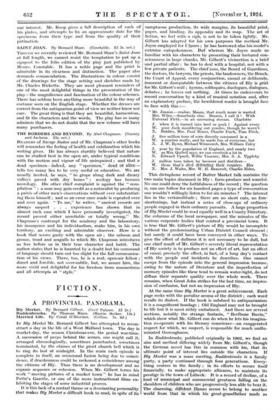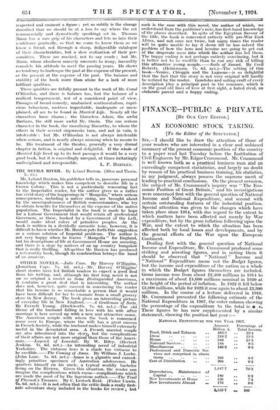FICTION.
A PROVINCIAL PANORAMA.
Married Life. By Conal O'Riordan. (Collins. 7s. 6d.)
IN Bly Market Mr. Bernard Gilbert has attempted to recon- struct a day in the life of a West Midland town. The day is market-day, the season Christmas-eve, the period war-time. A succession of peeps behind the scenes, one might call it, arranged chronologically, sometimes punctuated, sometimes terminated, by the chimes of the great church bell which is to ring its last at midnight. In the main each episode is complete in itself, an occasional fusion being due to coinci- dence, if drunkenness could be reckoned a coincidence among the citizens of Bly. Thus there is no development and no organic sequence or cohesion. When Mr. Gilbert terms his work " moving pictures of a market town " he has in mind Pathe's Gazette, or one of the more instructional films ex- hibiting the stages of some industrial process.
It is this lack of a central theme or a dominating personality that makes Bly Market a difficult book to read, in spite of its
sumptuous production, its wide margins, its beautiful print, paper, and binding, its appendix and its map. The art of fiction, we feel with a sigh, is not to be taken lightly. Mr. Gilbert has adapted for his own purposes the method Mr.
Joyce employed for Ulysses ; he has borrowed also his model's extreme outspokenness. Ba wherea's Mr. Joyce made us
familiar with his characters by presenting their tortured con- sciousness in large chunks, Mr. Gilbert's vivisection is a brief and partial affair : he has to deal with a hospital, not with a few private patients. The chief inns, the Board of Guardians, the doctors, the lawyers, the priests, the landowners, the Bench, the Court of Appeal, every conjunction, casual or deliberate, innocent or disreputable between the citizens of Bly is griit for Mr. Gilbert's mill ; hymns, soliloquies, duologues, dialogues, debates ; he leaves out nothing. At times he endeavours to record conversation by a kind of musical notation and, after an explanatory preface, the bewildered reader is brought face to face with this :- " Mr. Jimson.—realise, Maam, that much more is wasted Mrs. Wiles.—Somebody else. Brazen, I call it ! With External Field.—in an unceasing stream. Charlotte J. when it is turned into beef or pork ? Against every W. poor Jack mouldering out yonder, though he wasn't X. Biddies, Mrs. Paul Bones, Charlie Duck, Tom Fitch, J. five million tons of corn directly consumed in a W. a muckier really, and he made fun of everyone, but X. J. W. Rynn, Michael Winscomb, Mrs William &ley J. year by the population of England, and nearly two W. as Mrs. Quibell says, we can overlook a lot in X. Edward tTpsall, Willie Taurner, Mrs. S. A. Uppleby
J. million tons taken by brewers and distillers—
W. them that's died defending their country. Her X. Mrs. J. Wales, Mrs. W. H. Bancroft, Charles Elder, This dictaphone record of Butter Market talk contains the two main topics discussed in Bly : farm-produce and scandal. No one could deny the faithfulness of the record ; the question is, can one follow for six hundred pages a type of conversation one wouldn't willingly listen to for six minutes ? The interest lies in the verisimilitude ; there are no short cuts, no fore- shortenings, but instead a series of close-ups of ordinary
people engaged in their ordinary pursuits. A large proportion of Bly Market could be read equally well in a County Directory.
the columns of the local newspaper, and the minutes of the various corporate bodies that control a provincial town. It is true that Mr. Gilbert's picture of Bly would be incomplete without the predominating Urban District Council element ; but surely it could have been conveyed in other ways. To give the effect of dullness it is not necessary to be dull, but one chief result of Mr. Gilbert's severely literal representation of Ely society is to produce not an effect of art, but an effect of ennui, precisely the effect, in fact, of a long day's contact with the people and incidents he describes. One cannot escape from the episode into the general impression because, owing to the nature of literature and the imperfection of memory episodes like these tend to remain water-tight, do not diffuse their separate quality over the whole work. There remains, when Great John strikes for the last time, an impres- sion of confusion, but not an impression of Bly.
At the same time Bly Market is a great achievement. Each
page reeks with the peculiar aroma of the district ; each word recalls its dialect. If the book is subdued to antiquarianism it is a magnificent bondage ; Old England may not be brought to life but'it is most richly embalmed. And there are several sections, notably the •strange fantasia, " Beefbone Bavin," which show what Mr. Gilbert can do when he lets his imagina- tion co-operate with his literary conscience—an exaggerated respect for which, we suspect, is responsible for much unillu- minated thoroughness.
In Buddenbrooks, published originally in 1902, we find an aim and method differing widely from Mr. Gilbert's, though the German novel has this in common with his, that its ultimate point of interest lies outside the characters. If Bly Market was a mass meeting, Buddenfriooks is a family party, a party continued through four generations. Every- thing centres in the family ; in its efforts to secure itself
financially, to make • appropriate alliances, to maintain its prestige in the town of Lubeck.- It is a record of decline, of a load -of municipal and commercial greatness falling on the shoulders of children who are progressively less able to bear it.
The charming, ,diffident ,Hans seems to belong to another world from that in which his great-grandfather made so respected and eminent a figure ; yet so subtly is the change described that we should be at a loss to say where the rot (commercially and dynastically speaking) set in. Thomas Mann has a sure grip of his characters and lets us into their confidence gradually, so that we come to know them as we know a friend, not through a sharp, indigestible catalogue of their characteristics, but a slow realization of their per- sonalities. These are marked, not to say crude ; but Mr. Mann, whose aloofness scarcely amounts to irony, insensibly remodels his attitude to meet the passing years. He shows no tendency to burlesque the past at the expense of the present, or the present at the expense of the past. The balance and stability of the book more than atone for a lack of more brilliant qualities.
These qualities are fitfully present in the work of Mr. Conal O'Riordan, and there is balance too, but the balance of a resilient temperament, not of a considered point of view. Passages of broad comedy, unabashed sentimentalism, capri- cious behaviour, motives improbable, inadequate or unex- plained, all are to be found in Married Life. Nearly all the characters have charm ; the blameless Adam, the awful Barbara, the still more awful Mr. Onsin. The one serious character in the book, the moralizing Macarthy, to whom the others in their several shipwrecks turn, and not in vain, is intolerable : but Mr. O'Riordan is not always intolerable when serious, and is nearly always amusing when he means to be. His treatment of the theatre, generally a very dismal chapter in fiction, is original and delightful. If the whole of Married Life lived up to its best passages it would be a very good book, but it is exceedingly unequal, at times irritatingly











































 Previous page
Previous page